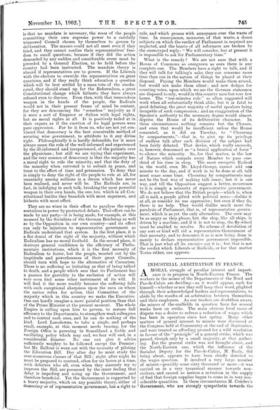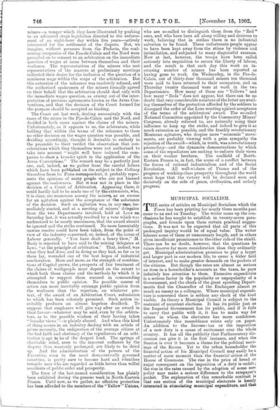INDUSTRIAL ARBITRATION IN FRANCE.
A MORAL struggle of peculiar interest and import- ance. is in progress in North-Eastern France. The workers in the mines of the Departments of the Nord and Pas-de-Calais are deciding—as it would appear, each for himself—whether or not they will keep their word, plighted through their acknowledged leaders and representatives, to abide by the results of an arbitration between themselves and their employers. As our readers are doubtless aware, the miners of the coalfields in question have for several weeks been on strike. The main obvious local cause of dispute was a desire to redress a reduction of wages which has been in operation since last spring. Many 'other matters of general interest to miners were discussed at the Congress held at Commentry at the end of September, and were treated as affording ground for a wild resolution in favour of the "principle" of a general strike, which was passed, though only by a small majority, at that gather- ing. But the general strike was not brought about, and the North-Eastern one, which the influence of the Socialist Deputy for the Pas-de-Calais, M. Basly, did bring about, appears to have been chiefly directed to the wages question. It involved a very large number of miners—possibly sonic sixty thousand or more—it was carried on in a very tyrannical manner towards non- strikers, and caused so serious a reduction in the supply of fuel that foreign supplies began to come in in very con- siderable quantities. In these circumstances M. Combes's Government, who are strongly sympathetic towards the miners—a temper which they have illustrated by pushing to an advauced stage legislation directed to the enforce- ment of an eight-hour day within five years—actively intervened for the settlement of the dispute. Not, we imagine, without pressure from the Prefects, the coal- mining companies of the Pas-de-Calais and the Nord were prevailed on to consent to an arbitration on the immediate question of wages at issue between themselves and their workmen. The representatives of the miners who met representatives of the masters at preliminary meetings indicated their desire for the inclusion of the question of a minimum wage within the scope of the arbitration. But this extension of the reference was resolutely refused, and the authorised spokesmen of the miners formally agreed on their behalf that the arbitration should deal only with the immediate wages question, as arising out of the inter- pretation of previous agreements known as the Arras Con- ventions, and that the decision of the Court formed for the purpose should be accepted as binding.
The Court sat last week, dealing successively with the cases of the mines in the Pas-de-Calais and the Nord, and decided in both cases against the claims of the miners. Unfortunately, as it appears to us, the arbitrators, while holding that within the terms of the reference to them no other decision on the wages question was possible, and deciding accordingly, thought it desirable to embody in the preamble to their verdict the observation that con- siderations which they themselves were not authorised to take into account " might well have induced the com- panies to show a broader spirit in the application of the Arras Conventions." The remark may be a perfectly just one, and, indeed, as we gather from the careful letters which have been published on the subject in the Colliery Guardian from its Paris correspondent, it probably repre- sents the opinions of many people who are not biassed against the coalowuers. But it was not in place in the decision of a Court of Arbitration. Appearing there, it could hardly fail to be made use of by the extremists, who, it is clear, are numerous among the miners, as an excuse for an agitation against the acceptance of the substance Of the decision. Such an agitation was, in any case, im- mediately started, and at a meeting of miners' delegates from the two Departments involved, held at Lens on Saturday last, it was actually resolved by a vote which was understood to be nearly unanimous, that the award should be ignored and the strike continued. No more lamentably unwise resolve could have been taken, from the point of view of the industry concerned, or, indeed, of the cause of Labour generally. " You have dealt a heavy blow," M. Basly is reported to have said to the mining delegates at Lens, "at the principle of arbitration." That, indeed, was what they had done, and in doing so they had, so far as in them lay, wounded one of the best hopes of industrial amelioration. More and more, as the strength of combina- tions of Capital grows, the prospects of fair treatment of the claims of workpeople must depend on the extent to which both those claims and the methods by which it is attempted to support them succeed in commending themselves to public opinion. No possible course of action can more inevitably estrange public opinion from the workmen than the rejection, on whatever pre- text, of the award of an Arbitration Court, submission to which has been solemnly promised. Such action in- evitably produces an almost hopeless deadlock. To suppose that employers will give way after an award in their favour—whatever may be said, even by the arbitra- tors, as to the possible wisdom of their having taken " broader views "—is plainly absurd. And when this kind of thing occurs in an industry clealit, with an article of prime necessity, the indignation of the average citizen at the bad faith and obstinacy of the repudiators of an arbi- tration is apt to be of the deepest kind. The springs of charitable relief, even to the innocent sufferers by the dispute thus wantonly prolonged, are likely to be dried up. And the administration of the powers of the Executive, even in the most democratically governed countries, is pretty sure to become hard and relentless towards men who are regarded as little better than wilful assailants of public order and prosperity: The force of the last-named consideration has plainly been exhibited during the present week in North-Eastern France. Until now, as we gather, no effective protection has been afforded to the members of the "Yellow " Unions, who are so-called to distinguish them from the " Red " ones, and who have been all along willing and desirous to work, believing that in strikes there is no industrial salvation to be found. These unfortunate people appear to have been kept away from the Clines by violence and intimidation, and subjected to many disgraceful excesses. Now at last, however, the troops have been called seriously into requisition to secure the liberty of labour, and the result is that each day this week an in- creasing number of miners has been reported as having gone to work. On Wednesday, in the Pas-de- Calais, out of thirty-four thousand miners ten thousand were said to have returned to their occupation, and on Thursday twenty thousand were at work in the two Departments. How many of these are " Yellows " and how many " Reds " does not appear, but there can be no doubt that very considerable numbers of the latter are avail- ing themselves of the protection afforded by the soldiers to disregard the order of the Lens meeting against acceptance of the terms of the arbitrators' award. The so-called National Committee appointed by the Commentry Miners' Congress, already referred to, are naturally using their influence to keep up the strike, and indeed to give it as much extension as possible, and the frankly revolutionary Montceau agitators, who despise mere " economic " move- ments, are probably viewing with a grim sympathy the rejection of the award—which, in truth, was a revolutionary proceeding—and the dynamite demonstrations by which some of the repudiators are seeking to enforce their views on their weaker brethren. The coalfield of North- Eastern France is, in fact, the scene of a conflict between the forces of rational industrialism and of the Social Revolution. All well-wishers of France and of the progress of working-class prosperity throughout the world must hope that the victory will be declared soon and decisively on the side of peace, civilisation, and orderly progress.























































 Previous page
Previous page